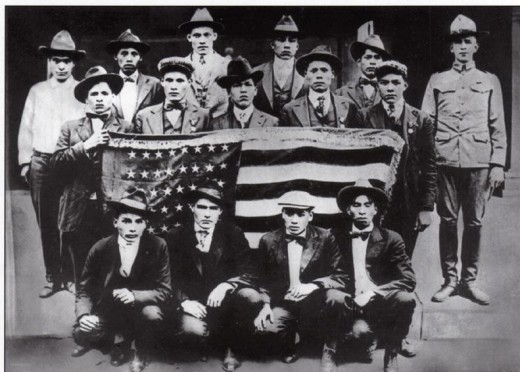World War I Choctaw Code Talkers
Code Talkers
Since the 2002 movie, Windtalkers, staring Nicholas Cage, most people have been made aware of the role played by the famous Marine Corps Navajo code talkers.
These were Navajo Indians from Arizona who joined the Marine Corps and worked as battlefield radio operators communicating with each other during battle using the Navajo language which the Japanese forces did not understand.
Thus, while the Japanese troops could intercept the radio communications of our troops, just as we were able to intercept theirs, they couldn't understand what was being said since they didn't understand the language.
Hub 19 for 30 Hubs in 30 Days Challenge

World War II Was Not the First War the U.S. Used Code Talkers
Also, because the Marines radio operators were speaking to each other in Navajo, the Japanese troops could not try to trick the U.S. troops by sending false messages on the radio channels used by the U.S. Marines since the Japanese did not know Navajo.
Having had an interest in history since childhood, I was aware of the Navajo code talkers.
However, it wasn't until a recent visit to the Arizona Military Museum in Phoenix, AZ that I discovered that the idea of using Native Americans speaking their language to communicate by radio on the battlefield originated with some Choctaw Indians in World War I.
The 14 World War I Code Talkers
The information in the Museum lists fourteen Choctaw soldiers in the U.S. Army's Thirty-sixth Division serving in the American Expeditionary Force (AEF) in Europe during World War I.
According to the account in the Museum these fourteen played a key role in winning some major battles during the Meuse-Argonne Campaign during that war.
The fourteen Choctaw soldiers were:
Albert Billy
| Solomon Louis
|
Mitchell Bobb
| Pete Maytubby
|
Victor Brown
| Jeff Nelson
|
Ben Caterby
| Joseph Oklahombi
|
James Edwards
| Robert Taylor
|
Tobias Frazer
| Calvin Wilson
|
Ben Hampton
| Walter Veach
|
Choctaw Code Talkers in Training

Choctaw Tribe Had Long Relationship With the United States
The Choctaw peoples were originally found in the southeastern part of the United States mainly in Florida, Alabama and Mississippi.
A few are still in this area, however, most are now found in Oklahoma.
The Choctaw had long had a good relationship with the European settlers and had sided with the Americans against the British during the American Revolution.
However, they were the first of the so called Five Civilized Tribes to be forcefully relocated from their traditional lands to the Indian Territory (now the State of Oklahoma) west of the Mississippi River during the Administration of President Andrew Jackson.
DVD About Indian Code Talkers in World War I and World War II
Like many of their fellow Native Americans, many Choctaw men volunteered to join the Army to fight in World War I.
This despite the fact that most Native Americans were not considered citizens and were thus exempt from military service.
Problem With Preventing Enemy From Deciphering Messages Intercepted in the Field
While fighting in France the Army had three main means of communicating at the front:
- Field telephones connected by telephone wires strung between various command posts.
- Radio communications.
- Written messages carried by runners (who also used bicycles or motorcycles to travel with messages between units).
The problem with telephones was that the enemy could tap the phone wire with a wire of their own and listen on on conversations.
Radio transmissions could be intercepted by other radios and runners with written messages could be shot or captured and their messages read.
Of course, all of the messages using any of these means were sent in code and each side had its own cryptographers who worked to break the codes of the other side while also working to continually devise new codes for their side to use.
While trying to come up with a solution to the problem someone came up with the idea of using the Indians to send messages in their native languages.
Choctaw Language Selected for Use as a Code
There were a number of Indians from various tribes including some Indian officers. After some discussions it was decided to use the Choctaw Indians.
Fourteen Choctaws, who were fluent in their native language as well as English, were selected and sent for special training.
Upon their return from training they were divided up among the various units and devoted their time to translating messages into their language for sending as well as translating messages received from Choctaw to English.
Although the Germans continued to intercept telephone, radio and written messages they were unable to decipher them thereby giving the American forces an advantage which helped them in the fighting.
Use of Native American Laguages in World War II
Choctaw and other tribes were used by the Army in Europe to some extent in World War II while the Marines relied on the Navajo Indians for transmitting information in the Pacific.
It appears that the Native Americans and their languages were used more extensively in the Pacific than in Europe.
This was due in part because Adolph Hitler was aware of the use of the Choctaw and their language during World War I. In anticipation of having to fight the United States in World War II, Hitler had sent teams of anthropologists to the U.S. before the war to study Native American languages.
Hitler's program was apparently not very successful but the U.S. also apparently knew that he had done this and did not rely on Native Americans as extensively in Europe as in the Pacific.







